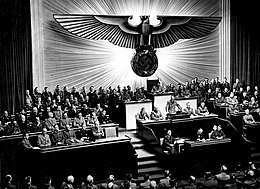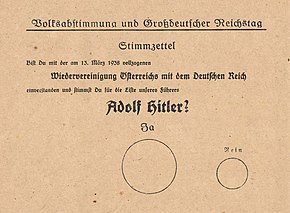Reichstag (Nazi Germany)
In 1920–1923 and from 1930 on, the Weimar Republic's democratically elected Reichstag was frequently circumvented by two legal instruments: The former practice became more and more common after 1930.
[citation needed] Following the Reichstag fire on 27 February 1933, Hitler persuaded President Paul von Hindenburg to issue the Decree for the Protection of People and State, which suspended most of the civil rights enshrined in the constitution.
[citation needed] At the new Reichstag's first session, Hitler introduced the Enabling Act of 1933, which allowed the government to enact laws on its own authority for a four-year period.
In the parliamentary elections of 12 November 1933, voters were presented with a single list from the Nazi Party under far-from-secret conditions (see below).
As a measure of the great care Hitler took to give his dictatorship the appearance of legal sanction, the Enabling Act was subsequently renewed by the Reichstag in 1937 and 1941.
On 30 January 1939, in the aftermath of Kristallnacht and rising international tensions, Adolf Hitler made a speech proclaiming that a war would lead to the "annihilation of the Jewish race in Europe.
"[3][4] On 1 September 1939 Hitler addressed the Reichstag, announcing the invasion of Poland and the beginning of World War II.
The Kroll Opera House was devastated by Allied bombing on 12 November 1943 (coincidentally, the tenth anniversary of the first Nazi Reichstag's election).
Because voter turnout was very high, and also because of new territories added to the Reich, and finally because the voting age was lowered (a compensatory measure adopted prior to the 1936 election to prevent the electorate from shrinking in size as a consequence of the Nuremberg Laws), the Reichstag grew to significantly greater and greater proportions.
It unanimously passed a decree proclaiming Hitler "Supreme Judge of the German People", officially allowing him to override the judiciary and administration in all matters.
[7] Any last remnants of the privileges of the Reichstag's members were removed and the Führer became de jure the final decision-maker, with the power of life and death over every German citizen.




